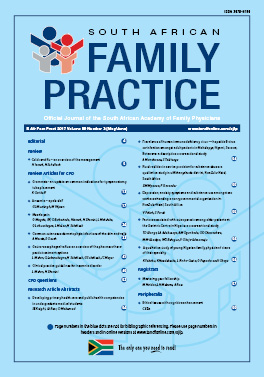Depression, anxiety symptoms and substance use amongst sex workers attending a non-governmental organisation in KwaZulu-Natal, South Africa
Keywords:
mental health, mental illness, sex workers, South Africa
Abstract
Background: Sex work is a high-risk occupation for mental health problems as sex workers are vulnerable to high rates of violence, sexual coercion, stigma and HIV. Aim: To determine the prevalence of depressive and anxiety symptoms and substance use in sex workers.Method: A crosssectional questionnaire survey of all men and women attending the Sisonke health initiative, a non-profit non-governmental organisation (NGO), for sex workers was conducted over three months. A socio-demographic questionnaire, the Self Reporting Questionnaire (SRQ 20), the Patient Health Questionnaire (PHQ 9) and the WHO Alcohol, Smoking and Substance Involvement Screening Test (ASSIST V3.0) were administered. Results: A total of 155 participants were surveyed. The prevalence of anxiety and depressive symptoms on the SRQ 20 and PHQ 9 total scores were 78.4% and 80.9% respectively. Some 40% of sex workers reported suicidal ideation in the year preceding the study. High rates of violence (n = 112, 72%) and childhood abuse (n = 107, 69%) were reported. The prevalence of HIV was 76.1%. The lifetime prevalence of substance use for nicotine (87.8%), alcohol (87.8%) and cannabis (87.7%) was high. Despite the high prevalence of psychiatric symptoms reported, only 15 (9.7%) participants were receiving psychiatric treatment at the time of the survey. Conclusions: The high prevalence of anxiety, depression, suicidal ideation, substance use and co-morbid HIV infection reported by sex workers and the significant treatment gap suggests an urgent need to provide an integrated health service that targets physical and mental health in sex workers. (Full text of the research articles are available online at www.medpharm.tandfonline.com/ojfp) S Afr Fam Pract 2017; DOI: 10.1080/20786190.2016.1272247
Published
2017-07-10
Section
Research Articles
By submitting manuscripts to SAFP, authors of original articles are assigning copyright to the South African Academy of Family Physicians. Copyright of review articles are assigned to the Publisher, Medpharm Publications (Pty) Ltd, unless otherwise specified. Authors may use their own work after publication without written permission, provided they acknowledge the original source. Individuals and academic institutions may freely copy and distribute articles published in SAFP for educational and research purposes without obtaining permission.

